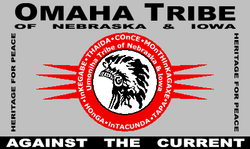Umoⁿhoⁿ | |
|---|---|
 Flag of the Omaha Tribe of Nebraska and Iowa | |
 Omaha tribal dancer | |
| Total population | |
| 6,000 | |
| Regions with significant populations | |
| Languages | |
| English, Omaha-Ponca | |
| Religion | |
| Christianity, Native American religion | |
| Related ethnic groups | |
| Siouan and Dhegihan peoples, esp. Ponca, Otoe, Osage, Iowa |
| People | Umoⁿhoⁿ |
|---|---|
| Language | Umoⁿhoⁿ Iyé, Umoⁿhoⁿ Gáxe |
| Country | Umoⁿhoⁿ Mazhóⁿ |
The Omaha Tribe of Nebraska (Omaha-Ponca: Umoⁿhoⁿ)[1] are a federally recognized Midwestern Native American tribe who reside on the Omaha Reservation in northeastern Nebraska and western Iowa, United States. There were 5,427 enrolled members as of 2012.[2] The Omaha Reservation lies primarily in the southern part of Thurston County and northeastern Cuming County, Nebraska, but small parts extend into the northeast corner of Burt County and across the Missouri River into Monona County, Iowa. Its total land area is 307.03 sq mi (795.2 km2)[3] and the reservation population, including non-Native residents, was 4,526 in the 2020 census.[4] Its largest community is Pender.[citation needed]
The Omaha people migrated to the upper Missouri area and the Plains by the late 17th century from earlier locations in the Ohio River Valley. The Omaha speak a Siouan language of the Dhegihan branch, which is very similar to that spoken by the Ponca. The latter were part of the Omaha before splitting off into a separate tribe in the mid-18th century. They were also related to the Siouan-speaking Osage, Quapaw, and Kansa peoples, who also migrated west under pressure from the Iroquois in the Ohio Valley. After pushing out other tribes, the Iroquois kept control of the area as a hunting ground.
About 1770, the Omaha became the first tribe on the Northern Plains to adopt equestrian culture.[5] Developing "The Big Village" (Ton-wa-tonga) about 1775 in current-day Dakota County in northeast Nebraska, the Omaha developed an extensive trading network with early European explorers and French Canadian voyageurs. They controlled the fur trade and access to other tribes on the Upper Missouri River.
Omaha, Nebraska, the largest city in Nebraska, is named after them. Never known to take up arms against the U.S., the Omaha assisted the U.S. during the American Civil War.
- ^ "Omaha Ponca Dictionary Index". omahaponca.unl.edu. Retrieved 2018-10-10.
- ^ "Winnebago Agency". www.bia.gov. Bureau of Indian Affairs.
- ^ "2020 Gazetteer Files". census.gov. U.S. Census Bureau. Retrieved 19 July 2022.
- ^ "2020 Decennial Census: Omaha Reservation, NE--IA". data.census.gov. U.S. Census Bureau. Retrieved 19 July 2022.
- ^ Cite error: The named reference
Campbellwas invoked but never defined (see the help page).